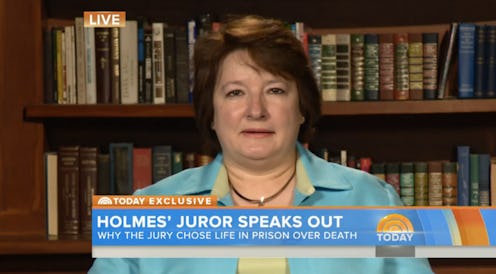News
An Aurora Shooting Juror Breaks Her Silence

A day after Aurora theater shooter James Holmes was sentenced to life in prison for his heinous crimes, a woman who sat on the jury broke her silence about the harrowing trial. The female juror, who spoke to the Today show Saturday morning on condition of anonymity, described how emotionally difficult it was for her and the other jurors to end up sparing Holmes' life even though he brazenly shot 12 people on July 20, 2012. Holmes, a graduate-school dropout, opened fire during a sold-out midnight screening of The Dark Knight Rises, wounding 70 people in addition to those he killed.
Even though the jury did not reach an unanimous verdict, Juror 17 — the moniker she's using to protect her identity — described the deliberation room as "very civil." She said all the jurors remained calm and open throughout the sentencing phase, and tried to be honest with each other. "We got right down to business," Juror 17 told NBC's Craig Melvin. "Everyone came to their individual verdict as we were instructed to do."
Still, an unanimous verdict could not be reached because there was one juror firmly against voting for the death penalty. "She felt that life was appropriate, and she would not be swayed," Juror 17 said. "She just said she couldn't do it [vote for the death penalty]."
While deliberating whether or not Holmes would live was emotionally taxing, watching the families and friends of the 12 victims react to the life imprisonment sentence was harder to stomach. "I can't speak for everyone but, for me, it was definitely painful," Juror 17 said Saturday on the Today show. "They will suffer for the rest of their lives, those that are living. ... And after we're long gone, they will continue to suffer.
Juror 17 added: "I personally hope and pray that life will be as good as possible for them [the victims' families]."
Because the jury was unable to come to a unanimous decision, Holmes automatically received life in prison without parole for the 24 counts of first-degree murder against him. His official sentencing won't take place until late August, but he's expected to be sent to ADX Florence, a supermax prison in Colorado that houses the most dangerous criminals in America.
In a previous interview with CNN, Juror 17 said there was more than one juror who wasn't entirely convinced about sentencing Holmes to death. Juror 17 told CNN that two jurors were on the fence about the death penalty, in addition to the juror who stood firmly in her position against it. It's unclear if these jurors had moral qualms against the death penalty, but that would also be unlikely — to sit on the jury for a death penalty case, you cannot hold any strong moral positions on capital punishment.
However, it's interesting to look at how death-penalty politics in Colorado may have played into the jurors' decision. The state's governor, John Hickenlooper, has repeatedly said he won't sign an execution order during his governance. Colorado is also a de facto non-capital punishment state, which means that even though it has capital punishment on the books, the penalty is rarely carried out. Since 1978, Colorado has only executed one person; currently, just three people sit on death row. So, even if the jury recommended the death penalty for Holmes, it's possible the Aurora shooter wouldn't have been executed at all.Image: screenshot/Today Show